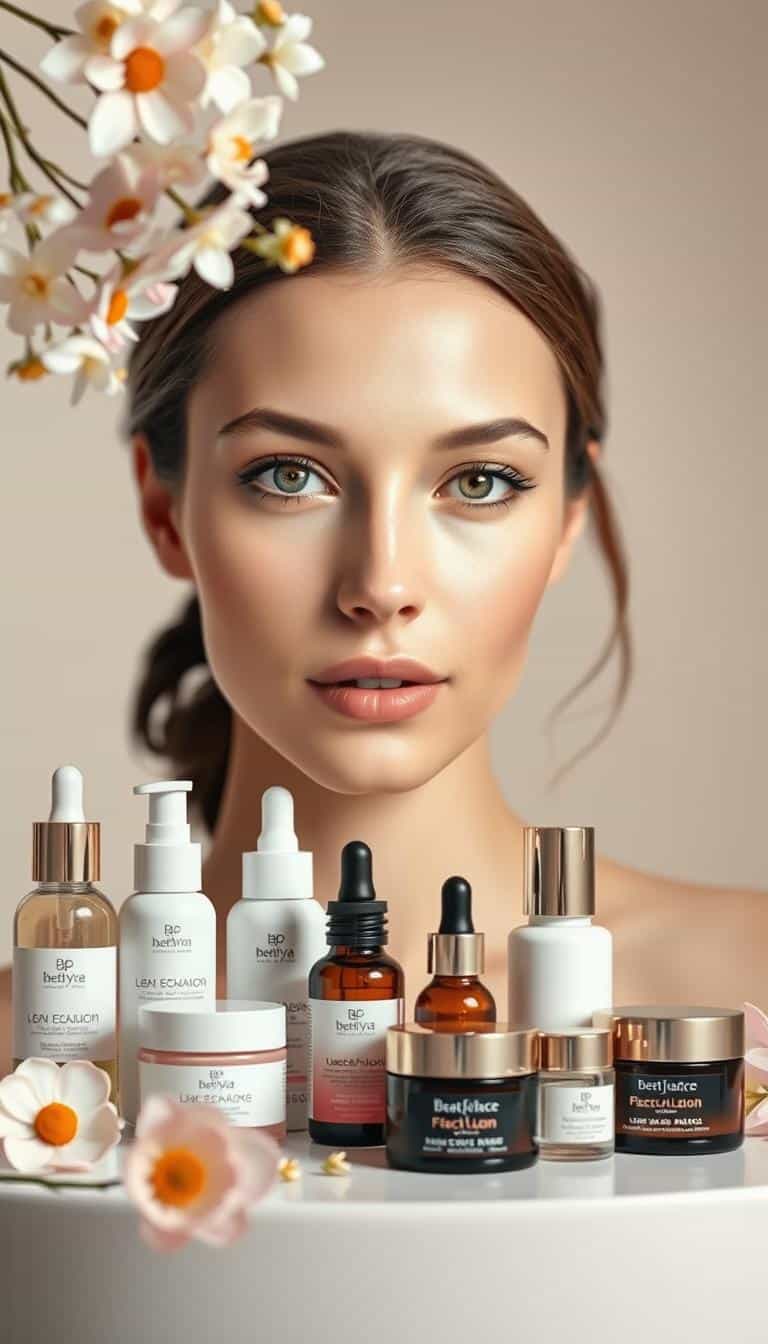Ever wondered why some people look younger than their age? It might be their skincare routine. It could be the secret to staying young.
In our 40s and beyond, our skin needs better care. These 10 skincare tips will fight premature aging and keep your skin young. We’ll cover sun protection and the best ingredients for anti-aging.
Forget about complicated routines and expensive treatments. We’ll share simple, science-backed tips to improve your skin’s health and look.
Key Takeaways
- Sunscreen is your #1 defense against skin aging
- Consistent skincare matters more than perfect products
- Diet and lifestyle significantly impact skin health
- Less is often more in skincare routines
- Stress management is crucial for youthful skin
Is Your Skincare Routine Helping or Hurting Your Skin?
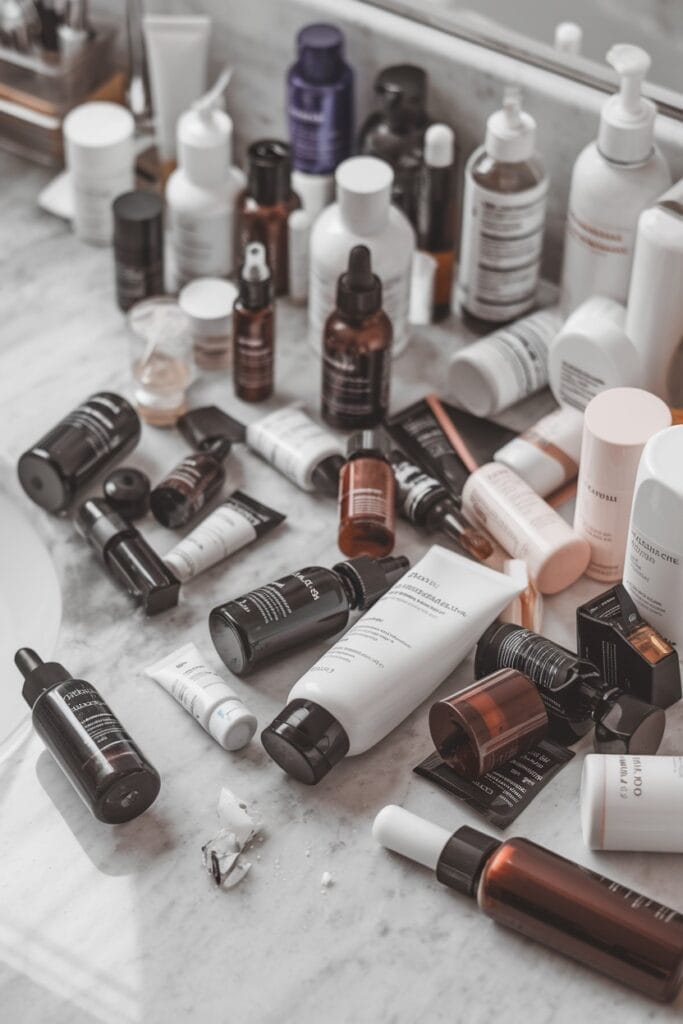
Your skincare routine might be harming your skin more than helping. Many people unknowingly make mistakes that speed up aging and damage their skin. It’s important to know these common mistakes to keep your skin healthy.
Not all skincare practices are good for everyone. What seems like a good routine might actually cause more harm. The best skincare routine is one that is carefully thought out and tailored to you.
Common Skincare Mistakes That Speed Up Aging
- Using too many products at once
- Not considering your skin type
- Not doing patch tests for new products
- Cleansing or exfoliating too much
Research shows that 70% of people with oily skin might clean their skin too much. This can make their skin produce more oil. A 2021 study found that using cleansers with a neutral pH can be less harsh on the skin. Also, about 30% of users get irritated from exfoliating too often.
| Skincare Mistake | Potential Consequences | Recommended Action |
|---|---|---|
| Over-layering products | Skin irritation | Simplify routine, use fewer active ingredients |
| Ignoring skin changes | Ineffective treatment | Reassess skincare needs seasonally |
| Using harsh ingredients | Inflammation | Choose gentle, pH-balanced products |
Remember, your skin is unique. What works for others might not work for you. Pay attention to how your skin reacts to different products. Be ready to change your routine if needed.
1. Skipping Sunscreen Every Day
Protecting your skin from sun damage is very important. Many people think sunscreen is only for sunny days. But, sun damage happens every day, no matter the weather.
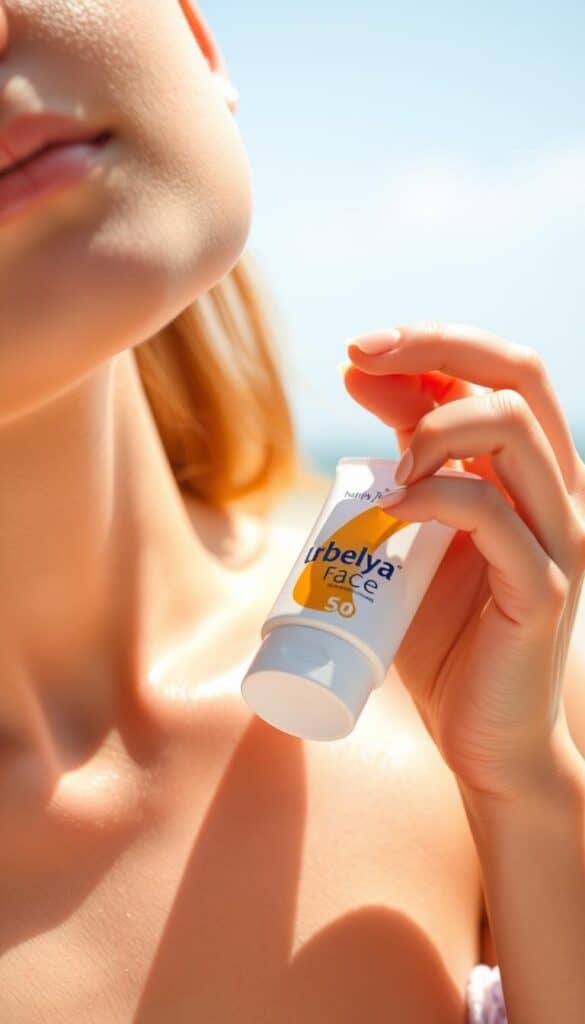
Sun exposure causes most premature wrinkles and skin damage. Even indoors or on cloudy days, UV rays can harm your skin. To keep your skin healthy, use sunscreen every day.
Best Sunscreen Ingredients for Anti-Aging
When picking a sunscreen, look for these ingredients:
- Zinc oxide: Protects against UVA and UVB rays
- Titanium dioxide: Offers great sun protection with little irritation
- Avobenzone: Blocks UVA rays that cause early aging
- Octinoxate: Shields against UVB rays that cause sunburn
The American Academy of Dermatology says use a sunscreen with at least SPF 30 daily. For outdoor activities, use SPF 60 or higher. Remember, apply about a half teaspoon for your face and neck. Reapply every two hours when in direct sunlight.
Consistent sun protection is key to preventing wrinkles and keeping your skin young. Make sunscreen a must-have in your daily skincare routine.
2. Over-Exfoliating or Using Harsh Scrubs
Exfoliation can be good or bad for your skin. It can make your skin glow, but too much can hurt it. Knowing how to exfoliate right is key for healthy, shiny skin.
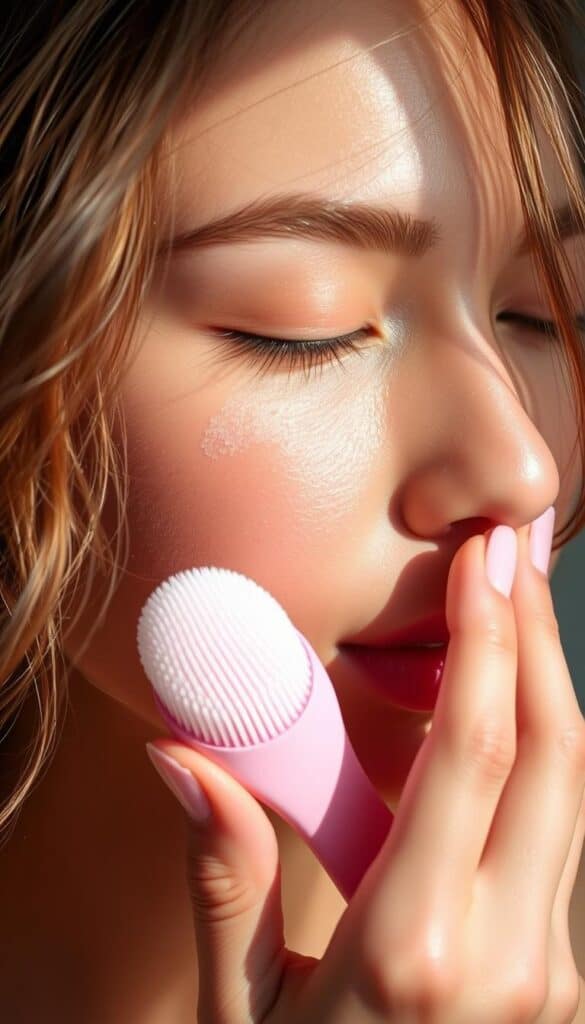
How Often Should You Exfoliate?
Dermatologists say to be careful with exfoliation. Most people should exfoliate 1 to 2 times a week. But, different skin types need different plans:
- Oily skin: Up to 3-4 times weekly
- Sensitive skin: Once weekly or less
- Dry skin: Maximum 1-2 times weekly
Signs you’re exfoliating too much include:
- Persistent redness
- Increased skin sensitivity
- Small, rough bumpy pimples
- Tight or irritated skin
For sensitive skin, try chemical exfoliants like lactic or glycolic acids. They are gentler than harsh scrubs. Listen to your skin and adjust your routine as needed. Remember, skin naturally sheds every 28 days.
If you’ve exfoliated too much, let your skin rest. Stop all exfoliating for one to two weeks. Focus on hydrating your skin and let it heal. When you start again, begin with once a week. Slowly increase if your skin can handle it.
3. Not Moisturizing Properly
Moisturizing is key for good skin care. Yet, 70% of people with acne think moisturizers make it worse. This belief can harm your skin and make you look older sooner.

Your skin needs water, and knowing how to moisturize can change your look. Dermatologists say to moisturize the same way every day. This keeps your skin young and shiny.
Signs You’re Not Moisturizing Enough
- Skin feels tight or uncomfortable after cleansing
- Increased oil production or unexpected breakouts
- Visible fine lines or premature wrinkles
- Rough or flaky skin texture
Experts say to moisturize on damp skin for better absorption. The American Academy of Dermatology also suggests moisturizing right after bathing. This helps keep moisture in.
Choosing the Right Moisturizer
- Lotions: Lightweight, ideal for oily skin
- Creams: Richer consistency for dry skin
- Ointments: Therapeutic for extremely dry areas
Pro tip: Choose moisturizers with ceramides and hyaluronic acid. These help keep your skin’s barrier strong and hydrated.
Remember, be consistent. Moisturize twice a day – morning and night. This keeps your skin healthy, protected, and glowing.
4. Using the Wrong Skincare Ingredients
Skincare ingredients can be confusing. Not all products are good for your skin. Knowing the right ingredients is key to looking young and bright.
Dermatologists say some ingredients are super important. They can change your skincare game. Here are the top anti-aging ingredients to look for:
- Retinoids: Powerful vitamin A derivatives that boost collagen production and accelerate cell turnover
- Peptides: Amino acid compounds that support skin’s natural repair processes
- Hyaluronic Acid: Provides intense hydration and plumps skin to reduce fine lines
- Antioxidants: Protect skin from environmental damage and free radicals
Top Anti-Aging Ingredients to Incorporate
Choose ingredients backed by science. A 2017 study found vitamin C boosts collagen and fades spots. Look for serums with:
- Grape seed extract
- Resveratrol
- Green tea extract
- Vitamins A, C, and E
Pro tip: Add new ingredients slowly. Start with small tests and add one product at a time. This helps avoid skin irritation.
Every skin is different. What works for someone else might not work for you. Talk to a dermatologist to find the best skincare for you.
5. Sleeping Without Removing Makeup
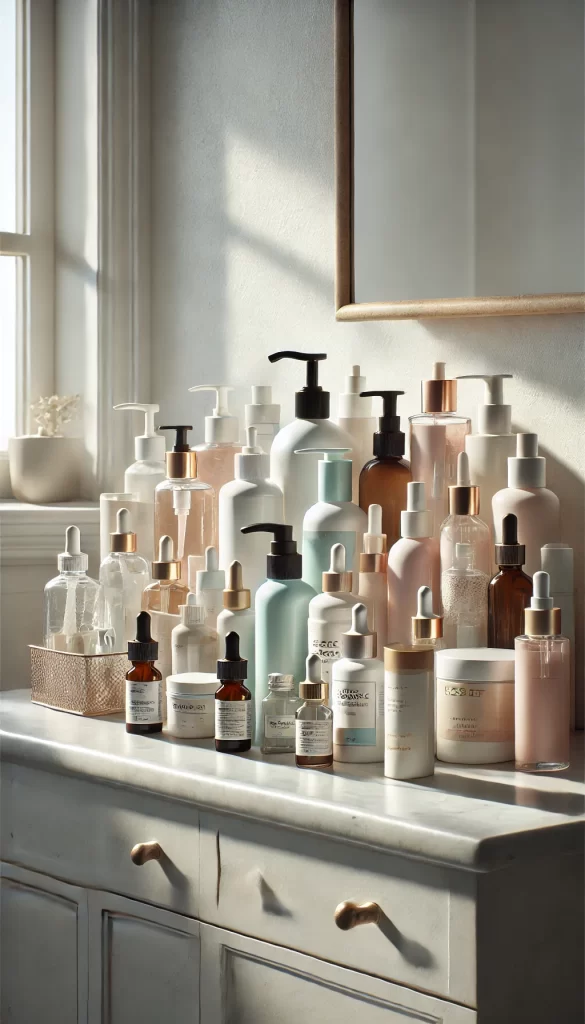
Your nighttime skincare routine is key for healthy skin and preventing early aging. Sleeping with makeup on harms your skin, causing many problems.
Leaving makeup on overnight stops your skin’s natural renewal. Ninety percent of dermatologists say this habit causes serious skin issues. Your skin must breathe and renew while you sleep.
The Best Nighttime Routine for Healthy Skin
Here’s a simple yet effective routine for clear and radiant skin:
- Remove makeup completely before bed
- Use micellar water for quick and thorough cleansing
- Double cleanse for stubborn makeup
- Apply a lightweight moisturizer
- Use toner to balance skin pH
Skincare routines are more than just removing makeup. They protect your skin from acne and other issues. Makeup holds dirt, oil, and bacteria, clogging pores and causing breakouts.
| Makeup Removal Method | Effectiveness |
|---|---|
| Micellar Water | 99% makeup removal |
| Oil Cleanser | 95% makeup removal |
| Makeup Remover Wipes | 75% makeup removal |
Pro tip: Keep makeup remover wipes by your bedside for those nights when you’re too tired for a full routine. Your skin will be grateful for preventing damage while you sleep.
Remember, healthy skin habits begin with a consistent nighttime skincare routine. Removing makeup is your first defense against aging and skin problems.
6. Neglecting Your Neck and Hands
Your neck and hands tell a story of your age. They show more about your skin’s health than your face. It’s important to care for these areas as much as your face.
The skin on your neck and hands is different from your face. They have fewer oils and less collagen, so they age faster. You need to take special care of them to prevent wrinkles.
Essential Care Strategies for Neck and Hands
- Apply facial skincare products down to your neck and décolletage
- Use SPF 30+ sunscreen on hands and neck daily
- Reapply sunscreen every two to four hours when outdoors
- Moisturize hands immediately after washing
- Use antioxidant serums to protect against free radical damage
Some ingredients can really help your neck and hand care. Retinoids help make collagen, and thick creams replace lost oils. Treatments like microneedling and laser therapy can also improve your skin.
Don’t forget, your neck and hands face the world all the time. Taking good care of them can slow down aging. This keeps your skin looking young and even.
7. Relying Only on Skincare (Ignoring Diet & Hydration)
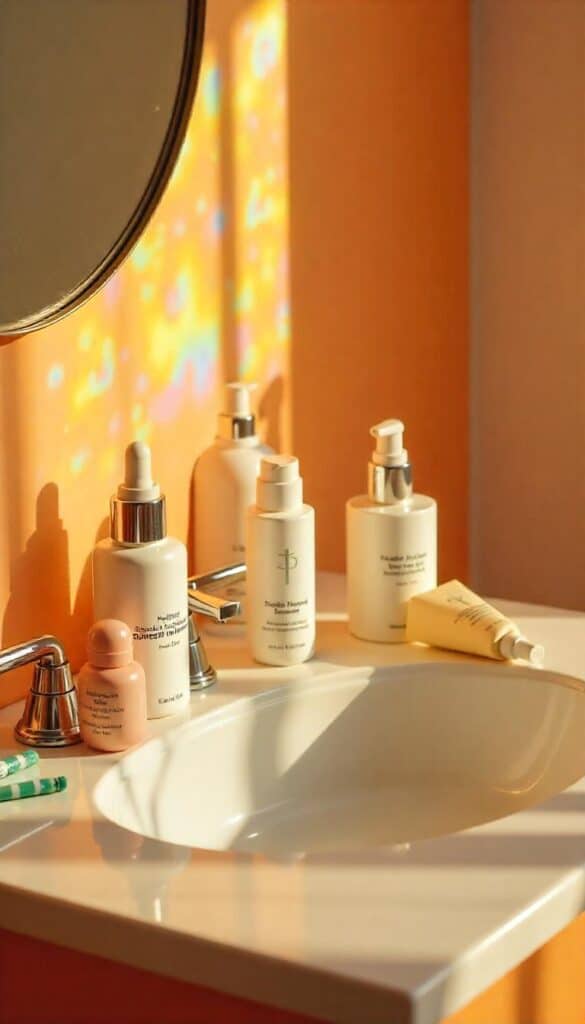
Your skin’s health isn’t just about expensive creams and serums. Natural skincare goes beyond just topical treatments. It also involves your diet and how much you drink.
Skin hydration is key to keeping your skin young and radiant. Studies show that skin loses a lot of water each day. So, it’s important to stay hydrated from the inside and outside.
Best Anti-Aging Foods for Glowing Skin
Eating the right foods can change your skin from the inside. Here are some foods to add to your diet:
- Wild-caught salmon (rich in omega-3 fatty acids)
- Blueberries and other antioxidant-packed berries
- Avocados for healthy fats
- Bone broth for collagen support
- Green tea for cellular protection
Drinking more water can make your skin much more hydrated. Studies show drinking more water can improve skin hydration by 20%.
| Food Category | Benefits for Skin | Recommended Intake |
|---|---|---|
| Omega-3 Rich Foods | Reduces inflammation up to 30% | 2-3 servings per week |
| Antioxidant Fruits | Protects against free radical damage | 1-2 servings daily |
| Hydrating Vegetables | Supports skin moisture | 3-4 servings daily |
Your glow up tips start with understanding that beautiful skin reflects overall health. By focusing on nutrition, hydration, and mindful eating, you’ll naturally improve your skin’s look and health.
8. Using Too Many Products at Once
In the world of skincare, more isn’t always better. The trend of complicated skincare routines can lead to serious mistakes that harm your skin. Recent studies show that 78% of people expanded their skincare routine during the pandemic. But this doesn’t mean complexity equals effectiveness.
Overloading your skin with multiple products can cause significant problems. Dermatologists warn that using too many skincare products can potentially compromise your skin barrier. This affects up to 50% of users with sensitive skin.
Building the Best Skincare Routine
Creating a simple skincare routine doesn’t mean sacrificing results. Follow these key guidelines to streamline your approach:
- Limit treatment products to 1-2 at a time
- Wait 30-60 seconds between product applications
- Avoid mixing active ingredients that can cause irritation
A basic skincare routine recommended by professionals typically includes:
- Gentle cleanser
- Lightweight moisturizer
- Sunscreen (most critical step)
| Routine Component | Benefit | Recommended Frequency |
|---|---|---|
| Cleanser | Remove impurities | Twice daily |
| Moisturizer | Reduce water loss | Morning and night |
| Sunscreen | Protect from UV damage | Every morning |
Remember, 60% of users experience better results when simplifying their skincare routine. Focus on quality over quantity, and give your skin time to adapt to new products. Your skin will thank you for a simple, effective approach to skincare.
9. Not Getting Enough Sleep
Your skin’s beauty secret might be hiding under your pillow. Sleep is key for healthy skin. Not getting enough sleep can hurt your glow and skin health.
Did you know over a third of American adults sleep less than seven hours? This can harm your skin’s look and speed up aging.
The Skin-Sleep Connection
When you sleep, your skin repairs itself the most. Your body fights wrinkles and fixes damaged cells. Not sleeping enough makes stress hormones that harm your skin.
- Increased skin inflammation
- Reduced collagen production
- Accelerated aging signs
- Decreased skin hydration
Sleep Strategies for Radiant Skin
Here are tips for better sleep and skin:
- Aim for 7-9 hours of quality sleep nightly
- Create a consistent sleep schedule
- Use silk pillowcases to reduce skin friction
- Practice stress-reduction techniques before bed
- Keep your bedroom cool and dark
By valuing sleep, you’re not just resting. You’re investing in your skin’s health and youth.
10. Ignoring Stress & Its Effects on Skin
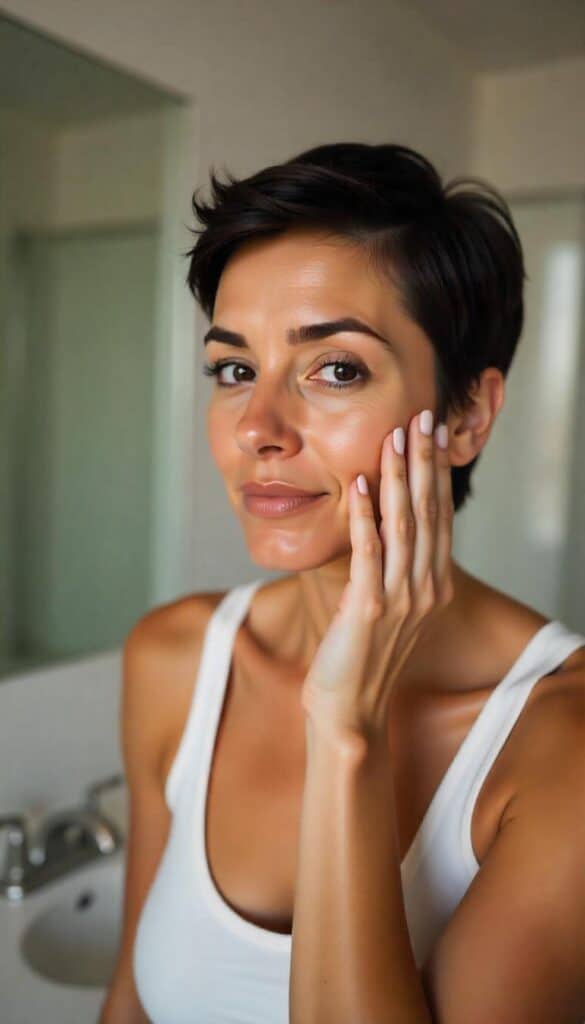
Stress isn’t just a mental challenge—it’s a direct threat to your healthy skin habits and youthful skin. Your body’s stress response can wreak havoc on your complexion. It triggers a cascade of harmful effects that accelerate aging and compromise natural skincare.
Chronic stress releases cortisol, a hormone that breaks down collagen and elastin. These proteins are crucial for maintaining skin’s firmness and elasticity. When stress becomes persistent, it can lead to:
- Increased oil production triggering acne breakouts
- Accelerated cellular aging
- Reduced skin circulation
- Inflammation and skin condition flare-ups
Easy Stress-Relief Techniques for Better Skin
Combating stress doesn’t require complex interventions. Simple, daily practices can significantly improve your skin’s health and appearance:
- Practice daily meditation for 10-15 minutes
- Engage in regular physical exercise
- Maintain a consistent sleep schedule
- Use deep breathing techniques
- Limit screen time before bedtime
By implementing these stress-management strategies, you’ll not only protect your mental well-being. You’ll also preserve your skin’s natural radiance and youthful glow. Remember, managing stress is a critical component of comprehensive skincare.
Action Steps
Your journey to healthier skin starts now! These skincare tips will help you transform your routine and achieve that coveted glow. Remember, a simple skincare routine doesn’t have to be complicated. It’s about consistency and choosing the right products for your unique skin.
Here are your key action steps to prevent premature aging and boost your skin’s health:
• Protect your skin daily with SPF 50+ sunscreen
• Develop a consistent 3-step routine: cleanse, treat, moisturize
• Use gentle exfoliation no more than twice weekly
• Always remove makeup before sleeping
• Invest in quality skincare products with proven anti-aging ingredients
• Stay hydrated and eat a skin-friendly diet
• Manage stress through meditation or relaxation techniques
• Get 7-9 hours of quality sleep nightly
• Consider professional treatments every 4-6 weeks
• Listen to your skin and adjust your glow up tips accordingl
Start small and be patient with your skin. Your future self will thank you for the investment in these simple skincare routine practices!
